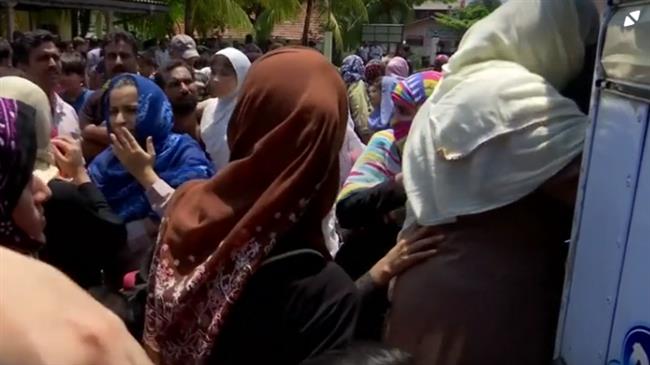Sri Lanka raids terror hideout amid fears of new bombings
Fifteen people, including six children, have been killed during a gun battle between Sri Lanka police and suspected militants, nearly a week after at least 250 people lost their lives in a string of bombings.
The new deaths came as police, backed by military forces, raided a house in the town of Sainthamaruthu in eastern Sri Lanka on Friday night, sparking an hour-long gun battle.
Local authorities said Saturday three men blew themselves up during the raid, killing three women and six children who were caught in the crossfire.
“Three other men, also believed to be suicide bombers, were found dead outside the house," police said.
Police were investigating the victims' possible relationship to the gunmen.
The clashes came hours after police raided a nearby location where they believed militants recorded a video pledge of allegiance to Daesh leader Abu Bakr al-Baghdadi before carrying out the Easter Sunday bombings.

The terrorist group had released footage of eight men whom it said had carried out the attacks last week. Sri Lankan officials said they were investigating the clip.
Police said they seized a large cache of explosives, 100,000 ball bearings and uniforms and flags similar to those worn by the men in the video.
The raid was part of a large-scale operation that has been launched in the aftermath of eight apparently coordinated blasts that hit churches and luxury hotels in the capital, Colombo, and the cities of Negombo and Batticaloa and left the country and the world in a great shock on Easter Sunday.
The government blames a small group, known as National Tawheed Jamath (NTJ), for the Sunday bombings but the group has not claimed responsibility.
The eastern cities of Kalmunai, Chavalakade and Sammanthurai remain under extended curfew until further notice, police said.
President Maithripala Sirisena announced a "major search operation" in the country on Friday, saying, "Every household in the country will be checked."
"The lists of permanent residents of every house will be established to ensure no unknown persons could live anywhere,” he said at a news conference.
The heightened tensions have put the South Asian country on edge as the leaders are under scrutiny over accusations that they failed to prevent the carnage despite security warnings that they had received several days ahead of the attacks.
The president blames the government of Prime Minister Ranil Wickremesinghe for weakening the security.
The prime minister, who had earlier charged that he did not receive the warnings, blamed the attacks on a "breakdown of communication."
According to government sources, opposing factions aligned to the prime minister and the president often refuse to communicate with each other and blame any setbacks on their opponents.
The prime minister took to Twitter on Friday and apologized for the failure.
“We take collective responsibility and apologies to our fellow citizens for our failure to protect victims of these tragic events," he wrote.
The archbishop of Colombo Cardinal Malcolm Ranjith, however, said he felt "betrayed" by the government's failure to act on the warnings.
Sri Lanka has a population of about 22 million people, 70 percent of whom are Buddhist, 13 percent Hindu, 10 percent Muslim, and seven percent Christian, according to the country’s 2012 census.
Fears of more violence have caused many people, including in Muslim communities, to leave their homes as intelligence services warned of more possible attacks.

Police forces were deployed around mosques on Friday as the community leaders called on Muslims to avoid going to mosques.
At least 700 refugees from a persecuted Islamic sect are in hiding after fleeing their homes in the Sri Lankan port city of Negombo, British daily the Guardian reported.
"A group of around 500 Muslims are being sheltered in one city, which the Guardian is not naming," the paper said.
There was a significant police presence outside their location and dozens of locals were protesting, calling for the group to be removed from the area, it added.
The attacks and its aftermath have affected livelihoods of the residents in Colombo.
VIDEO | Iran, US move ‘closer to agreement’ after ‘serious, longest’ round of talks: FM
Israeli army chief privately warns of cost of new war with Iran: Report
IRGC official: US buildup, psychological tactics aim to 'swallow Iran again'
Iran’s three-man team captures triple gold at UWW ranking series in Tirana
Iranian academic sentenced to 4 years in prison in France for supporting Palestine
VIDEO | Press TV's news headlines
Russia: West seeks to repeat past ‘plunder’ of Iran’s oil
Herzog visits Ethiopia to expand Israeli footprint in Africa













 This makes it easy to access the Press TV website
This makes it easy to access the Press TV website